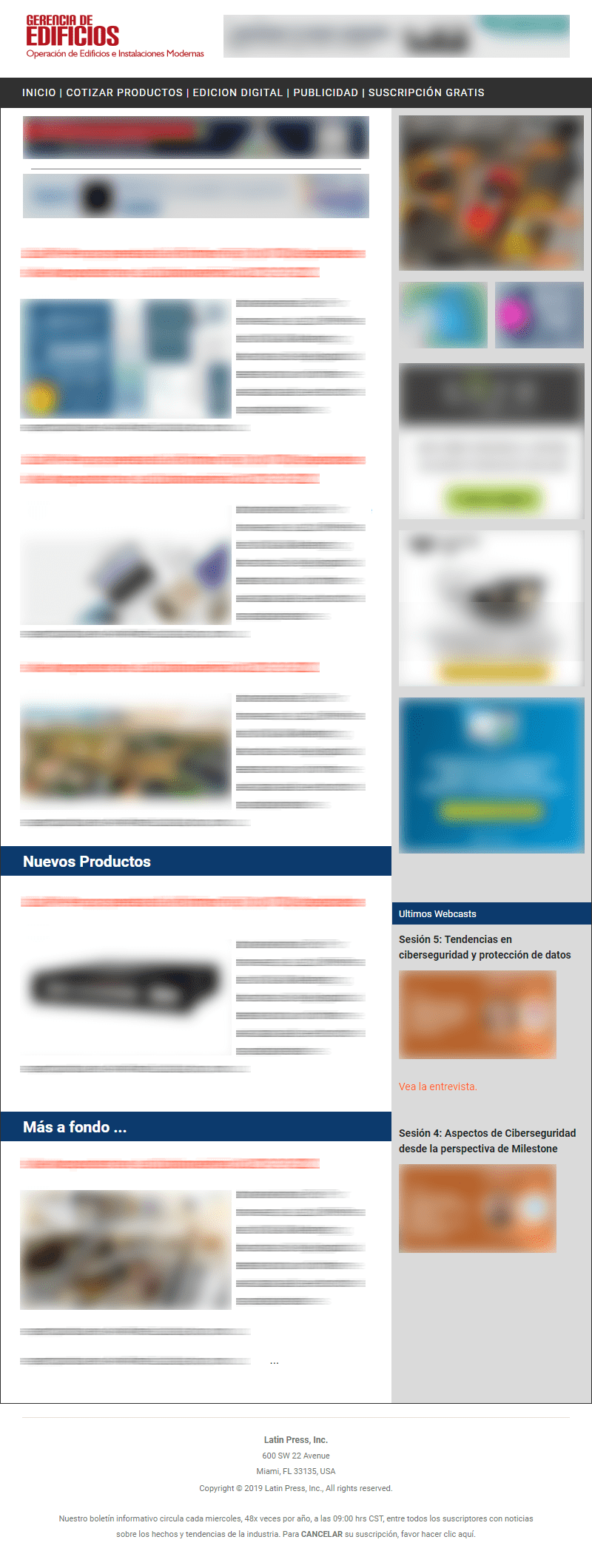 Many Latin American cities are emerging as strong destinations when it comes to health tourism. This implies that the hotel sector must make adjustments to respond to the needs of this new market niche.
Many Latin American cities are emerging as strong destinations when it comes to health tourism. This implies that the hotel sector must make adjustments to respond to the needs of this new market niche.
by Alejandra García Vélez
Nowadays the stay is not the most important source of income of a hotel, other business units such as meetings and conventions, restaurant or spa also play an important role in the development of the hotel offer.
In that sense, health tourism is consolidating itself as a niche to explore; in the first instance, luxury spas stand out as the service most offered by hotels in this field, but within health tourism there are other more specialized products, such as the accommodation of people after surgical interventions.
It is clear that to target this specific niche, an investment in both physical adaptations and staff training is essential, since in this case the hotel acts as a post-operative recovery center.
Step by step for good care
To know the experience of a person who handles this market perfectly, we consulted Maria Eugenia Franco, manager of the Antioquia regional sales office of Hoteles Estelar, a chain that has been betting heavily on consolidating itself in medical tourism and that has in the city of Medellín, Colombia with an offer that has already positioned itself as an option for important medical centers in that city.
First, the issue of the adaptations that the hotel must have to serve customers with special medical needs was addressed; In this regard, Franco said that "because health tourism guests are different from corporate or rest plans, to fully respond to this niche market, the hotel must be willing to transform a good part of its facilities and its organization."
As expressed by the official, these changes must be made on several fronts, starting with the care staff who need to be prepared to respond to the patient's needs in three aspects. First, to raise awareness of the particular needs of the guest; likewise, review and train employees in legal, medical and first aid terms, including first services in medical emergencies; and finally prepare them to provide modifications or additions to the service that exceed the guest's expectations.
As for the facilities, these must be adapted to the necessary conditions of mobility and attention of guests with special conditions, including access for the disabled or patients with difficulties for movement, access and private registration with exclusive elevator for patients, wheelchair access and bathrooms for the disabled, private restaurant, rooms in quiet corridors away from noise, access to rest or recovery areas in shaded areas of great tranquility for the patient.
Also, details such as having remote control for air conditioning, ease of access to electrical connections, ramps and rooms located on the first floors are essential.
It is also a basic condition to avoid mats, baseboards, curtains and blinds that accumulate dust, have adjustable beds, emergency telephone and telephones in the bathroom, bed or connected room for the companion, manual shower, seat in shower or tub, and added values in the rates such as laundry, 24-hour room service and menus for special diets.
Franco also pointed out the importance of having nursing and first aid services, "although this is not the specific function of a hotel, it must have special nursing services or be minimally prepared in first aid; ideally, a nurse licensed to provide full- or part-time medications, 24-hour emergency services that must be outsourced, and staff with training in wound healing and first aid are available."
In the case of Estelar Hotels, in addition to the architecture and physical adaptations already mentioned, María Eugenia Franco highlights the offer of suites or apartments with one or two bedrooms, living room, kitchen and independent bathrooms; also the possibility of oxygen connection, emergency doorbell in the rooms, wet area with jacuzzis, sauna and Turkish baths and gymnastics equipment for exercises with instructors specialized in people with mobility difficulties.
For his part, Iván Salazar, commercial coordinator of the Howard Johnson Guayaquil Hotel, indicated that although by standard many chains require that there be rooms for people with disabilities, there are other determining factors when making a lodging decision, for a person with special medical needs, including that the hotel has shared rooms, good location and that you have a hotel insurance that can provide medical attention in the room, treatment or transfer by ambulance if required.
A market to explore
Now the question is whether it is worth it for a hotel to devote so much effort, time and money to preparing to host medical guests. In reality, health tourism in Latin America is still incipient, and although there are countries in the region that are increasingly consolidated as important destinations in this field.
In that sense, Franco commented that "today approximately 65% of the income in the Colombian hotel industry comes from conventions and conferences. While only 2.2% of tourists entering the country are health tourists; the question is whether health tourism can generate long-term revenues similar to those obtained today by conventions."
And he added that "the need for savings in health care expenses as a result of the new reform of the health system in the United States, will become a strong generator of this type of market for our region."
In that order of ideas, he said that health tourism presents hoteliers with the opportunity to open up to a new market niche that is not yet being as competitive as the corporate one, it also raises as advantages the sustainability of the market in the long term, the opportunity to have another source of income, and the greater possibility of income per room being such a specialized sector.
Salazar, for his part, affirms that "the growing volume of guests looking for the best alternative in price, services, location and guarantees to treat their ailments, forces us to think that these requirements must be met as soon as possible, since their demand is linked not to one, but to several stays in the same year and usually several nights at a time".
Finally, the recommendation for those who consider venturing into this niche is to make financial projections taking into account analyzing competitive factors with similar hotels. Also, establish agreements with health centers, but especially with insurance companies, which are the most important distribution channel in health tourism, since negotiations and payments can be made directly between them and the hotels.
After having fully identified the potential of the market, "it is essential to carry out an exhaustive analysis of the current facilities, which will allow you to identify what you have and to what extent you would be willing to make the necessary adaptations for the attention of guests with special conditions," concluded Franco.
To highlight
Spa: added value for the medical guest
In addition to the details that must be taken into account to give the best possible care, the Spa remains of vital importance for this type of client and a fundamental component of health tourism.
The hotel establishment must have an offer that includes, among other things, a wide variety of alternative therapies such as ayurveda, acupuncture, acupuncture, acupuncture, yoga, post-operative treatments, diets, skin treatments and masseurs trained in recovery and post-operative processes.











Leave your comment